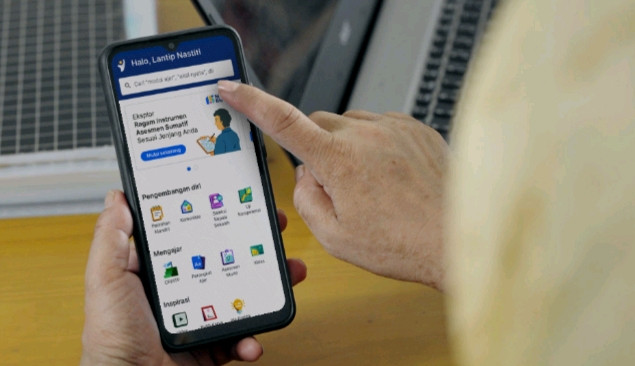Popular Reads
Top Results
Can't find what you're looking for?
View all search resultsPopular Reads
Top Results
Can't find what you're looking for?
View all search resultsMinistry's technology platform speeds up the digitalization of education
Ministry of Education, Culture, Research, and Technology(Kemendikbudristek) remains committed to accelerating the transformation of education, particularly through the utilization of various digital platforms to strengthen the educational ecosystem, especially in primary and secondary education.
Change text size
Gift Premium Articles
to Anyone
M
inistry of Education, Culture, Research, and Technology(Kemendikbudristek) remains committed to accelerating the transformation of education, particularly through the utilization of various digital platforms to strengthen the educational ecosystem, especially in primary and secondary education. The Merdeka Mengajar Platform (PMM), Education Report, School Procurement Information System (SIPLah) and School Activity and Budget Planning Application (ARKAS) are examples of four digital services launched by Kemendikbudristek. These platforms enhance efficiency in the learning process, simplify education management and monitoring and increase transparency and accountability in the use of school budgets.
Minister of Education, Culture, Research, and Technology Nadiem Anwar Makarim, stated that technology supports educators and education personnel to advance and develop further. "Schools are like organizations. A culture of learning only emerges when human resources are good. To support HR development, we have created various technology platforms that enhance the capacity and performance of educators and education personnel," he said in Jakarta recently.
For example, the PMM provided by Kemendikbudristek helps teachers participate in training and various skill-enhancement programs independently. "They can level up their skills independently. There are tens of thousands of modules available. Teachers can also build learning communities with other teachers. For instance, those in Java can create communities or study groups with teachers in Papua or Maluku," he explained.
Similarly, the Education Report of Indonesia, introduced in the 19th Episode of Merdeka Belajar, offers a comprehensive report on the results of the National Assessment, providing cross-sectoral analysis for educational units and regions. The Education Report serves as a tool for reflection and problem identification, enabling educational units to design data-driven improvement strategies. The minister explained that this platform is designed to facilitate more measurable and data-driven education improvements.
As of March 2024, all local governments had accessed the Education Report, and 90 percent have utilized this information for data-based planning and budgeting. Likewise, more than 350,000 educational units across Indonesia have accessed the Education Report, and nearly 90 percent have used it to improve various educational indicators.
"I am greatly assisted by the data and school achievement conditions in the Education Report, allowing me and the teachers to determine which priority indicators we will reflect on and improve," said Eri Anggerianto, principal of SD14 state elementary school in Sijuk, Belitung regency, who is also the chairman of the Kepang Dua Learning Community.
The principal of SLB1 Jakarta, Dedeh Kurniasih, said the Education Report made the education evaluation process more focused. "It already identifies the root problems and provides recommendations for improvements, such as enhancing teacher competencies," she said.
Moreover, technology platforms like SIPLah and ARKAS are specifically designed to improve the management quality of educational units. SIPLah, designed to streamline the procurement process of goods and services in schools, offers a catalog of verified goods and services, allowing schools to order more efficiently and transparently. As of now, there are 18 online marketplace partners in the SIPLah ecosystem, offering a total of 5.7 million products/services.
As of June, 273,647 schools had used the platform. With SIPLah, schools can access various products and services needed for educational activities more quickly and easily. The platform is equipped with reporting features that facilitate schools in monitoring and reporting expenditures, ensuring that funds are used according to the set budget. SIPLah aims to increase accountability and transparency in school budget management, reducing potential discrepancies in the procurement process.
Meanwhile, ARKAS is also designed to assist school education personnel in planning, recording and reporting the use of Educational Operational Assistance Funds (BOSP). With various updates, ARKAS is now in its fourth version, offering more practical, convenient and secure features. The latest version includes better integration with SIPLah, a more intuitive interface, and automatic tax calculations. As of June, 392,709, 91.28 percent, of schools actively used the application.
A stakeholder satisfaction survey in 2023 revealed that 80.99 percent of users were satisfied with using ARKAS and SIPLah. The innovations provided are believed to offer ease and convenience for teachers and school principals in managing BOSP funds. Safari, the principal of SMA2 state senior high school in Konawe Selatan, Southeast Sulawesi, said ARKAS and SIPLah had a significant impact on the school because they simplified planning, administration and reporting. "The integration of ARKAS with SIPLah has greatly simplified our work. The planning process, which used to take a long time for validation, is now much faster," said Safari.










